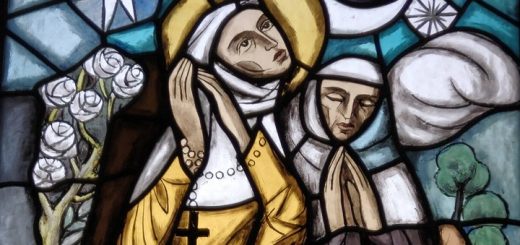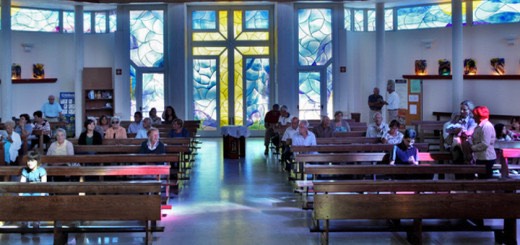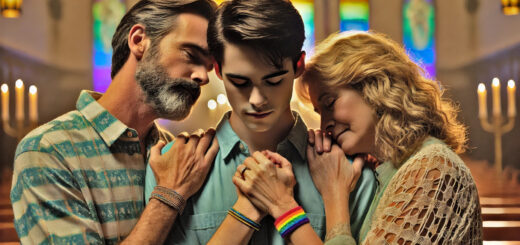Don Andrea Conocchia e la sua chiesa aperta alle persone transgender
Articolo di Luca Lancise pubblicato su Millenium, supplemento mensile de Il Fatto Quotidiano, n.40, anno 4, novembre 2020, pp.50-53
«Padresito lo trovi sempre, lui non lascia da solo nessuno», dice Naomi ripetendo, nel suo accento argentino, il nome col quale lei e un’altra ventina di transessuali sudamericane chiamano don Andrea Conocchia, parroco di Torvajanica, cittadina balneare a mezz’ora da Roma. E il padrecito, che si scrive con la C ma si pronuncia con la S, risponde: al telefono, ai messaggi vocali, a quelli scritti in chat, ma soprattutto alle mani che vengono a bussare alla sagrestia della Beata Vergine Immacolata, la parrocchia che domina la piazza centrale del lungomare, e non importa se le unghie sono lunghissime e laccate di rosso vivo a colorare esistenze tutt’altro che immacolate.
Quelle di Alejandra, Claudia, Marcela e le altre che da dieci o vent’anni, qualcuna da più di trenta ormai, si prostituiscono nelle pinete del litorale sud di Roma, lungo la Litoranea senza marciapiedi o nei piccoli appartamenti delle palazzine basse, alcune abbandonate e molte condonate, che puntellano la striscia d’asfalto tra l’Agro romano e le spiagge rese livide dall’autunno.
It is the landscape in the midst of which Don Andrea, 49 years old who do not see each other under black hair and facipid eyes, landed a year ago and where he moves, agile and fast with his panda loaded with food and clothes, as he learned to do when he was still a "parish priest without parish" in the neighboring territory of the Lido dei Pini: "I did not have the headquarters, I said put on the street, in the campsites and on the edge of the public, I went to people, and people stopped ... »he says. Then the "promotion": the beautiful church that looks at the sea, in spite of the eco -monster that is facing her, a former abusive hotel that has become a ruin of cement pending demolition.
The time to settle down, and Last March Don Andrea ended up in the newspapers: committed to distributing aid to the city community during the Lockdown, which also blocked the customers of the trans leaving them without a penny, one day it is seen to arrive in the parish, driven by despair to look out where it usually does not be seen. And Don Andrea has opened the door, because "giving the food package is a celebration of mass, it is as if it were charity: give bread, says Jesus, and they live only with prostitution, it is their work, but they came for a primary need, food".
And when in the following days the other trans day also took courage, he thought of something more: he decided to write to the Pope's Ambosiniere, Cardinal Krajewski, directing a request for help from Torvajanica's trans help, also daughters of Latin America, and the most painful one. And the Pope replied, sending envelopes with the timbre of the Holy See, with the name of the trans recipient and with "the united subsidy of 200 euros on behalf of the Holy Father, who accompanies the gift with the invocation of the desired divine help and comforts, and the prayer to provide for some needs".
Then Don Andrea thought of registering a vocal thanksgiving message, sent to the Aelosiniere to make him listen to Francesco directly in his language, and the trust has become unconditional: Father Andrea, in these six months, has transformed himself into a point of reference, the only one in these parts, for the small community of transsexuals who also brings him the recipes to read. And patience if someone turns the nose, especially among the "colleagues".
"We tried, with a couple of priests," says Claudia, a childhood lived when the military tortured homosexuals in Argentina, "but they never answered, or had to make an appointment that no longer arrived". And instead Father Andrea replies. "It takes a church that risks," he says, the rest, he explains, is already everything in the Gospel: "The Lord was not only with those who went to the temple on Saturday, was with the lepers, the cripples, the lost: do I have to be alone with those who come to the Mass every day or Sunday?".
By the way: now that the rumor has scattered, not only among the trans, Don Andrea is also collecting doubts, outbursts, the fears scattered in the community of the faithful, young and adults: a mother arrived crying, because ́ Her son is homosexual and a priest to whom she turned to her told her that "God made us male and females, point". And instead Don Andrea: "Madam dear, we must all learn that between the male and the female there are the nuances, I am also learning it". Or a teenager who went to tell him like this, "Don, something that had to do not happen: I fell in love ... of a girl". And he: "And why didn't it happen?".
It is a question of shaded, physical and doctrinal boundaries, for Don Andrea, and an area like this, between spots of greenery and concrete spots, on the threshold between the center and the margin, is the mirror: "Being on the border means dealing with the nuances, with the ambiguity in which perhaps we church men also struggle to be: I imagine that in our hearts there are in the shade parts, Or in the other they can sometimes come out, we take awareness of it or awareness over the years ", says Don Andrea, and now it seems to speak almost to himself:" Even not wanting, there are sensations that you warn, you can see, perceive and that maybe repress, hide from yourself but also for example to the bride, the colleague, to the partner or the partner: this is the thing that, listening to these friends, can be discovered ".
The thought goes to some calls received: "Do you realize that they are favoring prostitution? But are these trans who do, they convert? "It seems dramatic to me: in short, we cannot make a gesture of pure gratuitousness, of grace, that is, free?", Don Andrea is wondered. "I don't give you bread so that you become a Catholic, but why we aré we are brothers." At a certain point, the parish priest tells, "I asked:" How should I call you? Girls, women, men? ". "No, transsexuals," they told me. "
One of the last letters entrusted to Don Andrea appears: "Dear Francesco, in reality I was born a child. Who knows if you have ever received a letter from 'one as one more", says Naomi, who to redeem the debt for his slice of the Italian sidewalk has paid 5 thousand euros and now walk and that's it, without stopping in a place otherwise he has to pay again.
And the customers? "If there are the trans it is because someone goes there and usually they are baptized, confirmed, Catholics, the community I don't know if you notice or not of these appearances, nobody speaks, as if he did not see, he did not know, he knew," he reflects Don Andrea. «Among them they know each other, help each other, but for others there are only as prostitutes and some make this anger. They have in common the great pain they have lived and still live, compared to their condition, "he says. And he adds: "With some now we pray together, I have seen them cry so that they were ashamed of the life they had made and did not want to write it to Pope Francis, they did not consider themselves worthy of being helped by him".
But then, Father came to Torivajanica: "We must become experts of humanity, yes, but meeting real humanity, the real one that God sends us on the road, not the ideal one: why it is important to start from the person", leaves, before returning to say mass.






